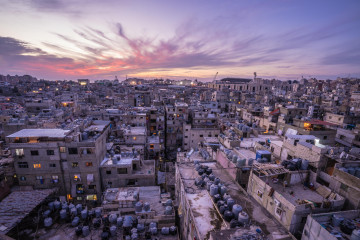

Ireland's submission to this year's Oscars has nothing to do with Ireland. Backed by Chelsea and Hillary Clinton's Hidden Light Production Company, In the Shadow of Beirut tries to imagine itself in the impoverished and revolutionary neighbourhoods of Sabra and Shatila neighbourhoods from 2018 to 2022.
C0-directed by Stephen Gerard Kelly and Garry Keane, the film registers the everyday exchange of blows between underprivileged Lebanese alongside displaced Palestinians and Syrians.
In it, we learn striking facts: 30,000 people share about a kilometre of living space, and there is little to no public service with no cleaning or a proper water supply. Garbage and sewage are all around.
Many of the residents do not have legal papers — let alone work permits — and so are not entitled to any social or health services.
"If any of my children get ill, I wouldn't be able to take them to hospital. They could die in front of my eyes," says a mother-of-five.
Sadly enough, such a fate befalls another family – their 11-year-old Saarea born with a painful, disabling and never properly treated skin disease passes away throughout the shooting process as the camera closely follows the domestic care that the mother undertakes before her death and the heartbreaking mourning in the aftermath.
"The themes of In the Shadow of Beirut are all too common: exploited minors, early marriages, possessive husbands, and rare diseases. Haven't we had enough of the stories told exclusively through the Western gaze, told with pity and obscene curiosity?
Another little boy is forced to earn a living instead of going to school to help his family make ends meet due to the hyperinflation following the Lebanese economic crisis.
Meanwhile, 13-year-old teenager Sanaa gets engaged to an older guy, with the blessing of her father who hopes that a good marriage might lift her out of poverty.
Nevertheless, soon after, the prominent husband becomes jealous and combative, and his drug affairs lurk beneath the surface. Naturally, their partnership does not work. Fortunately, the engagement can be easily broken off.
As in Lebanese filmmaker Nadine Labaki’s successful fiction Capernaum, which features unprofessional actors who transfer their real lives to the screen, In the Shadow of Beirut focuses on children’s troubles in the urban jungle.
Unlike Labaki’s discovery, Zain Al Rafeea — who at the time of filming Capernaum was a 12-years-old Syrian refugee from the slums but is now a legal citizen of Norway and a budding actor — the young characters from In the Shadow of Beirut seem to have stayed where they were found with little benefit from displaying their misery on screen.
None of them have decided to take their parents to court as Zain does in Capernaum, or the film crew for sticking their cameras into their lives without giving them a hand and helping them get out of destitution.
When Saarea’s mother says that her daughter wouldn’t have died if it weren’t for the family’s poverty, one cannot help but think that the film production could have gifted part of its generous budget and offered medical help to this girl.
|
The themes of In the Shadow of Beirut are all too common: exploited minors, early marriages, possessive husbands, and rare diseases. Haven't we had enough of the stories told exclusively through the Western gaze, told with pity and obscene curiosity?
Without the benefit of the title, In the Shadow of Beirut could be happening anywhere in the world that has been left behind. It seems that what interests the filmmakers more is not the human destinies that they encounter and portray on screen, but rather their collective image of sorrow.
This image, once again, panders to Western notions of life beyond the limits of the West itself.
The decision to select this film for the Oscars is telling. It was meant to be a supposedly compassionate selection, in reality, it reinforces the idea that beyond the so-called civilised world is all desperate chaos.
Somewhere between a docu-drama and an investigative report; filmed, edited and soundtracked with diligent professionalism close to sterility, In the Shadows of Beirut is more an informative sort of “eye-opening” work about the way people live in those neighbourhoods than an interpretative piece of artistic documentary cinema.
The authors’ voice is absent as we hear participants’ testimonies directly, skilfully strung together. On the one hand, this gives them more space to express themselves, but on the other, the withdrawal of the authors suggests a certain indifference and the film looks like a custom job.
Mariana Hristova is a freelance film critic, cultural journalist, and programmer. She contributes to national and international outlets and has curated programs for Filmoteca De Catalunya, Arxiu Xcèntric, goEast Wiesbaden, etc. Her professional interests include cinema from the European peripheries and archival and amateur films




 Follow the Middle East's top stories in English at The New Arab on Google News
Follow the Middle East's top stories in English at The New Arab on Google News


